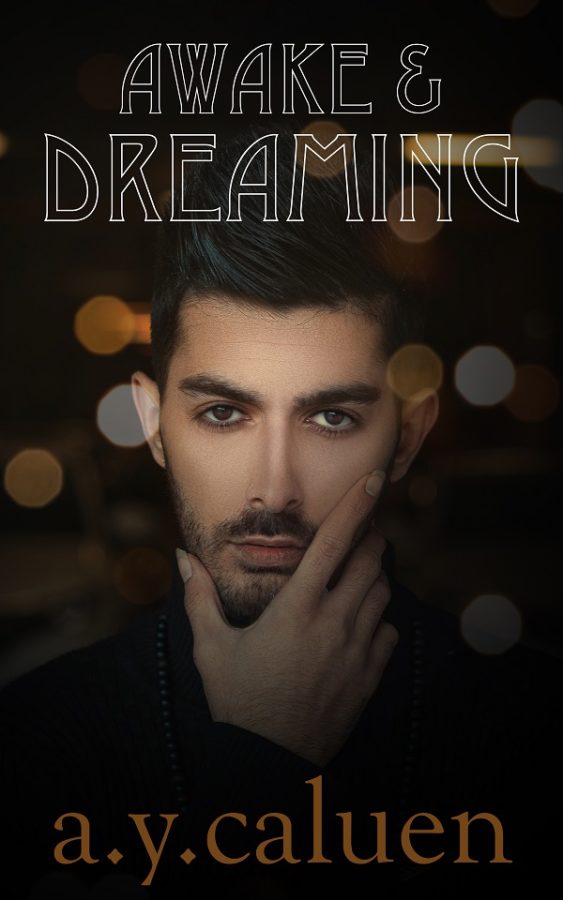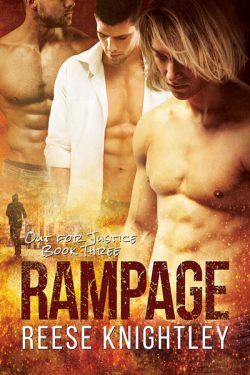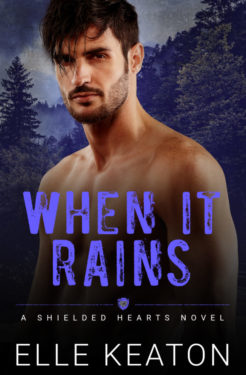by
When Freddie Chandra went through the casino kitchen to see what was causing the commotion, he expected to find the usual: a cluster of vehicles in the alley, all refusing to give way. What he found instead was six people yelling at each other over a seventh, a thin dark man who made not a sound.
Edmund Robert was mostly thinking well I’m buggered because he had no papers to display, no one was speaking in English, and the sign language he’d relied on for years wasn’t getting him anywhere. Then the most beautiful man in the world walked out of the kitchen, shut the rest of them up, and went to look at Edmund’s makeshift shelter. When he returned to the now-silent group, he said, “Bower bird.” Edmund looked up, startled, thinking how did you know?
In short order, Edmund was David Marlowe. Along with the new name, he had a proper job, and the safest place in the world to live. Not long after that, he also had Freddie. But the man at the top was going to Los Angeles to make a movie, and Freddie – the interpreter, the man who could speak to anyone – was going with him. Leaving David – the man who couldn’t speak at all – alone on the private island. Safe, working, surrounded by friends, but more alone than ever.
They were both such beginners at love. They’d barely learned how to be together. How on earth could they survive being apart?
- 1 To Be Read list
Publisher: Independently Published
Genres:
Pairings: M-M
Heat Level: 4
Romantic Content: 5
Ending: Click here to reveal
Character Identities: Gay
Protagonist 1 Age: 18-25
Protagonist 2 Age: 18-25
Tropes: Coming of Age, Interracial Relationship, Office / Workplace Romance
Word Count: 70200
Setting: South Pacific and Los Angeles
Languages Available: English
Series Type: Same Universe / Various Characters
When Freddie returned to the alley, now casually dressed in jeans, a tour tee shirt, and trainers, the thin man was waiting for him. Sitting cross-legged in his shelter with a homemade oil lamp for light, marginally better-groomed than he had been an hour or two since. His wavy, shoulder-length, coal-black hair gleamed. He wore a different shirt, one that had received at least an attempt at a wash in the recent past. As Freddie approached, the man crept out of the shelter and stood, pulling a folded paper from his jeans pocket and presenting it with both hands. Freddie knew he sounded surprised when he said, “Thanks.” He unfolded the paper and shifted so the light from the hotel fell on it.
Dear Sir
My name is Edmund Robert. I am eighteen. I worked my passage here but have no papers. I will gladly serve you and Mr. Lhasong.
Thank you
READ MOREFreddie noted the grammar and spelling, wondering what in hell the story was. He said, still looking at the paper, “I went to work for Mr. Lhasong eight years ago. I was fifteen.” He glanced up, studied the wary but hopeful face of Edmund Robert, and knew he couldn’t walk away. That business of his boss possibly having work for the man was a smokescreen. It was for Freddie to determine.
There was so much risk. There always was. If not for years spent learning – sometimes painfully – to distinguish between bad intentions and good (even when ‘good’ was relative), he wouldn’t have been sure he could trust himself. Being drawn to the man because of the eyes, and the inexplicable appeal of that decorated shelter, were considerations best dismissed. On the other hand, there was the politeness, the evident resourcefulness, and the way he stood there now. Willing to serve, willing to trust. Not in the way of someone who simply didn’t care what happened to him, but in the way of someone who was prepared to believe the best of people.
Five years younger than Freddie. Not so young that the best thing to do was ship him home. Or at the very least get him some papers, find out what English-speaking country he’d like to live in, and send him there. Young enough that peace and good treatment could very likely resolve whatever trauma had driven him from home in the first place.
Edmund watched the other man think. He was barely taller than Edmund, not nearly as old as he’d seemed in that suit, and not at all afraid. Either he was some kind of martial-arts expert on top of looking like a film star, or he could tell he was in no danger. It was amazing how many people – even people of color – were afraid of a darker-skinned man. He’d practiced being nonthreatening, after a few brushes with the consequences of adolescent belligerence.
What was he thinking now? Deciding whether to bring Edmund along, or was that decision already made? Where was ‘along’ to be, anyway? Not that it mattered, so long as it was away from here. Away from the police who now had their eyes on him. And at least he could communicate.
Freddie made a snap decision, the kind he’d been making for thirteen years, since he first realized what he could do and what it might mean. “I’ll tell you all about it on the yacht. My name’s Freddie Chandra.” He offered a hand; Edmund shook it. “We’ll need to get you papers. Do you want to keep that name?”
Edmund knew he looked startled. He shook his head.
“Have you a preference?” A nod this time. “We’ll be leaving in thirty-six hours. There’s much to be done. Come in with me, and we’ll begin.” Edmund turned away toward his shelter, hesitated, turned back. He looked a bit torn. Freddie couldn’t guess how long this had been the man’s home but he recognized the fear of leaving it, and the pang of loss. He dug his phone out of his pocket. “Have a seat, sir. We’ll take a picture so you can remember. It was not so bad here, was it?”
Edmund thought how can you know, and shook his head again. He got in and sat by the lamp. Freddie took several pictures, with and without flash. They both knew when Edmund left, someone else would claim the shelter. Claim it, or take it apart.
“You’ll have your own cabin on the yacht, and on the island.”
This was the closest to ‘his own’ that Edmund had ever had. But he hadn’t got this far by clinging to the safe-seeming familiar. He reached behind the pallet for the battered metal toolbox that held his only change of clothes, his few bits of money, and his two small treasures. Then he blew out the lamp, stood again, and followed Freddie.
COLLAPSEUlysses on Queeromance Ink wrote:Alexandra Caluen is a new-to-me author and I have not read any other books in the compilation. ‘Awake and Dreaming’ can be read as a stand-alone. I found this to be an unusual, interesting, odd, sweet slow romance, engaging story. Yes. All of those. At once.
Unusual in that Edmund aka David is an Australian aboriginal who ran away from the missionary he was living in, he cannot talk, was homeless on the street, yet made an instant connection with Freddie. I also found it unusual in both main characters show an incredible amount of restraint and maturity despite being under the age of twenty-five.
‘Awake and Dreaming’ was interesting because Freddie was once himself in need of a helping hand, and even though he’s now a private assistant for a very wealthy Asian celebrity, he hasn’t lost sight of helping others. David has enough education, awareness of others, and confidence that he’s able to step forward and help even without being able to vocalize. As the story progresses, the secondary characters really support the premise of open-mindedness and supporting others which I found quite fulfilling.
The oddness stemmed from the worldbuilding. Despite the overall story line being very humble, the world Freddie’s employer and all of the staff for said employer is a world far, far different from mine. Private islands, private chefs, private nurses, condos around the world, no-questions-asked funds… borderline fantastical.
And addressing the sweet and slow romance together. The overall story is just so sweet and heartwarming and when combined with the slow romance between Freddie and David it made for a wonderful comfort read. This was the one place where the characters’ ages provided conflict, where they each questioned how to maintain a long-distance relationship with one in a celebrity spotlight and the other, very much not.
Combining all those aspects above - the unusual backgrounds, the fantasy island aspect, the sweetness of young romance, the insecurities of new love – made for an engaging read. My only regret was the story ended a tic too soon, or I could have used an epilog, I wanted to know where life took the main characters! Based upon ‘Awake and Dreaming’, I would read more by this author.
Alexandra Caluen’s “L.A. Stories” are apparently a group of loosely-linked stand-alones, each focusing on the coming together of two people with complicated back stories. “Awake & Dreaming” is, I’d wager, the book most thinly tied to Los Angeles, and possibly the most diverse in terms of its characters.
The plot arc of “Awake & Dreaming” is a fairly straightforward romance; it’s the context and the players who stand out. We begin in a back alley behind a casino in Macau, the former Portuguese trading colony, now one of the jewels in the not-really-Communist Chinese empire. A dark-skinned teenager, discovered living in a homemade shelter behind the casino, finds himself rescued by a beautiful young Indian man who speaks equally beautiful English. The boy speaks not at all, but communicates through notes. Freddie Chandra, the Indian man, sees the care with which the boy has built his shelter, creating a tiny spot of beauty and safety out of other people’s rubbish. He sees something in this mute boy that no one has ever seen before
There is something magical—although nothing at all paranormal—about this story. Almost none of the characters are either white or western. Freddie, who seems so beautiful and powerful to the young Edmund, is only a few years older, and owes everything he is to Taka Lhasong and his wife Helen, who own the casino—and a lot of other things as well. Taka Lhasong is an international pop singer and celebrity, vastly rich and immensely discreet. He and Madame Lhasong agree to let Freddie take on Edmund as a project, trusting in his instincts and intelligence. Together, Freddie and the Lhasongs transform Edmund into David, and give him a life beyond his wildest dreams.
This is a tale of people at the margins of the world who somehow find each other and form a kind of family. Aside from the actual storyline, it is also a kind of treatise on potential, on the power of chance and generosity to create something good out of something that has been thrown away by the world.
Los Angeles, with its mythical reputation as a city of dreams, becomes the focus of the plot only in the last part of the book, where the relationship between Freddie and David—and that between Freddie and the Lhasongs—shifts yet again in an unexpected direction. This is a kinder, gentler Los Angeles than one generally sees in books, and I loved the way the author makes it clear that it represents a United States that, for all its deep flaws, also offers a chance for happiness.
The evolving relationship between Freddie and David is, of course, the core of the book’s narrative. The very conventionality of their developing romance is offered as a counterpoint to their backgrounds—neither of these young men should have lived to adulthood, much less found themselves in the life they have. The boy-meets-boy aspect of the story is tempered by their dark and troubled origin stories. Having never known what love is, their approach to their own emotions is introspective and free from society’s expectations. Whether in the Edenic setting of a tropical island, or the luxurious glitter of LaLaLand, Freddie and David must figure out how to grasp the happiness fate has placed before them.





